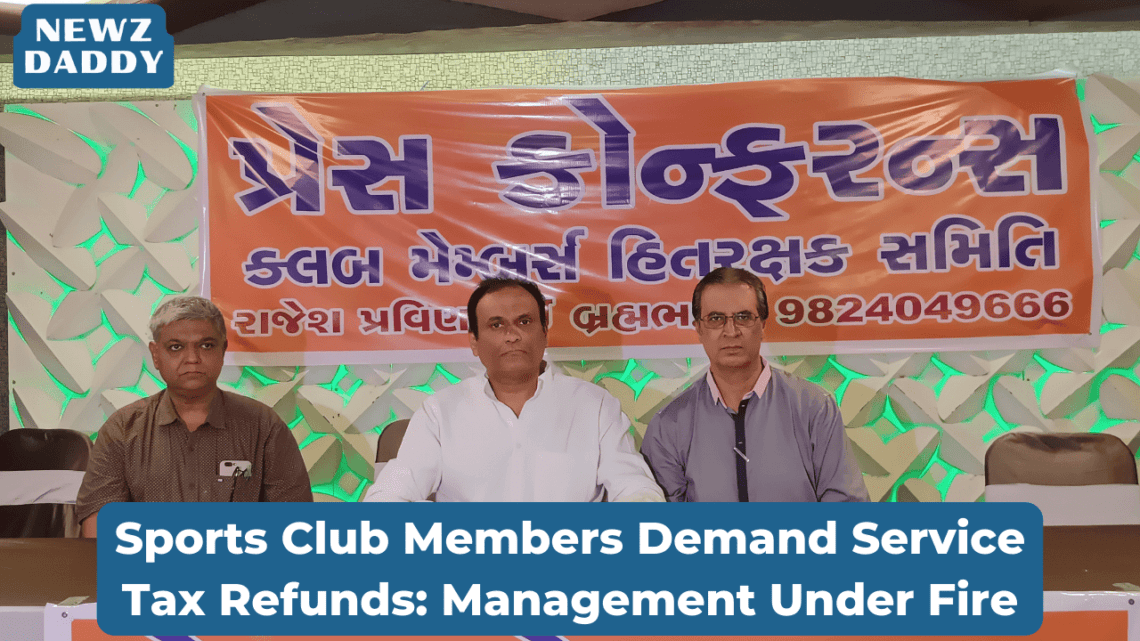Sports Club Members Demand Service Tax Refunds: Management Under Fire
Newz Daddy Daily News Updates
The Sports Club of Gujarat, situated in the Navarangpura area of Ahmedabad, is facing severe backlash from its members. The club’s management is under scrutiny for its intimidating and arbitrary behaviour towards its members. Despite a Supreme Court ruling that exempts the club from paying service tax on charges collected from its members, thousands are still waiting for refunds. Members are now threatening mass protests if the management does not address the issue promptly.
Must Read:
Celebrating a Milestone: 100 Kidney Transplants at Marengo CIMS Hospital
Club Members’ Plight
Rajesh Brahmabhat, a long-time member of the club and spokesperson for the Club Members’ Protection Committee, has expressed his frustration. “I have been a member of the Sports Club of Gujarat for the last seven years,” he said. “I have repeatedly approached the management regarding the refund of the service tax, but their response has been far from satisfactory. Instead of addressing our concerns, they have been acting arrogantly.”
In 2019, the Supreme Court ruled in the case of the State of West Bengal Vs. Calcutta Club Limited that clubs and their members are not separate entities. As a result, services provided by the club to its members are not subject to service tax. This ruling should have led to immediate refunds of service tax collected from club members. However, the Sports Club of Gujarat has been slow to comply.
A Long-Standing Issue
Between 2005 and July 2017, 2,511 members paid service tax on their entry fees, amounting to approximately Rs. 5 crores (50 million). However, by May 20, 2024, only 243 members had received refunds totaling Rs. 75.62 lakh (7.562 million). The remaining members are still waiting for their refunds, and the club management has not provided a clear timeline for when these payments will be made.
The sports club has around 8,500 members who are collectively owed around Rs. 10 crores (100 million) in service tax refunds. Rajesh Brahmabhat and other members have made numerous representations to the club management, but their pleas have largely been ignored. “If we do not receive a clear and satisfactory response from the club management regarding the refund of our money, we will have no choice but to escalate the matter and launch a vigorous protest,” Brahmabhat warned.
The Financial Implications
The service tax issue is not just about the money owed to the members; it also highlights the financial mismanagement within the club. The amount involved is significant, and the delay in refunds raises questions about the club’s financial health and transparency. Members are demanding accountability and transparency in how their money has been handled.
The members of the Sports Club of Gujarat are determined to get their rightful refunds. They are urging the club management to adhere to the Supreme Court’s ruling and return the service tax collected from them without further delay. The members are also calling for better communication and more respectful treatment from the management.
If the club management continues to ignore the members’ demands, the situation is likely to escalate. Members are prepared to take their grievances to higher authorities and stage mass protests. Such actions could draw wider attention to the issue and put additional pressure on the club management to resolve the matter.
Conclusion
The Sports Club of Gujarat is facing a critical moment. The way the management handles the service tax refund issue will have significant implications for its relationship with its members. A prompt and fair resolution is necessary to restore trust and ensure the smooth functioning of the club. The members’ patience is wearing thin, and they are ready to take drastic measures to get what is rightfully theirs.
Call to Action
The club management needs to take immediate steps to address the concerns of its members. This includes providing a clear timeline for the refund of service tax and improving communication with the members. By doing so, the management can avoid further conflict and build a stronger, more transparent relationship with its members.




